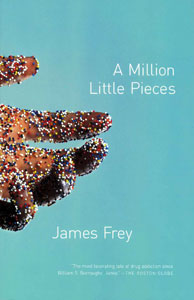Addiction
You Remember James Frey?
Is he an example of a writer who completely outgrew his addiction?
Posted January 15, 2014

Recovery manual, or what?
It's hard to summarize the James Frey story. He wrote a wildly best-selling memoir about his drug and alcohol addiction, A Million Little Pieces, in which it turned out he exaggerated the extremity of his behavior and for which Oprah famously confronted him on her show.
One thing that was ignored about Pieces was that it was anti-12-step and that Frey opposed the disease theory of addiction throughout his book, including his stay at Hazelden (the name of the rehab was disguised).
“I’d rather have that (relapse and death) than spend my life in Church basements listening to people whine and bitch and complain. That’s not productivity to me, nor is it progress. It is the replacement of one addiction with another.”
“I know I won’t ever believe in the Twelve Steps. People like you keep saying it’s the only way, so I’m thinking that I might as well just put myself out of my misery now and save myself and my family the pain.”
“Addiction is not a disease…Diseases are destructive medical conditions that human beings do not control…I don’t think it does me any good to accept anything other than myself and my own weakness as a root cause.”
Everyone just assumed Frey was a 12-stepper, and that his book was a recovery manual—in his earlier appearances on Oprah he seemed to play to this assumption, without declaring himself one way or the other.
Flash forward. Frey took a hit from Oprah and his publisher, but he recovered to write several more adult best sellers and then started his own production company. In subsequent Oprah shows he and the host kissed and made up. Frey has emerged from the entire experience fundamentally unapologetic about it.
He was thrilling, condescending, rude, empowering, and haughty. “He didn’t show an ounce of self-doubt,” says Philip Eil, then a first-year nonfiction student. “Not a second of wavering. He was 110 percent that there was no truth, that he would live forever through his books.”
Meanwhile, Frey turned himself into a highly profitable industry (now called Big Jim Industries!) and wrote the best-selling young-adult series "The Lorien Legacies," of which the first book, I Am Number Four, was made into a hit film by DreamWorks.
So, there is a lot of good news about Frey, and many people find Frey is an extremely good story teller and writer.
Some bad news has also emerged. In a New York Magazine article, and other places, writers have accused Frey of hiring them to contribute to his book series, and then of ditching them and taking credit for their work. One such case, with the author of I Am Number Four (or is that the co-author, or not an author at all), ended up in great acrimony and a court case.
Meanwhile, Frey proceeds full steam ahead as one of the most successful writers of our era. He has signed to do a new young-adult series:
“Endgame” would include three novels, nine digital novellas and multimedia elements such as YouTube videos, interactive games and puzzles, and social media. Google’s Niantic Labs is one of the partners in the project.
But this post is not about (a) Frey's qualities as a writer or (b) questions about Frey's moral fiber.
This post is about Frey's alcoholism, addiction and recovery:
- How do you feel about Frey's rejection of AA and the 12 steps in his book?
- If he emerged from his addiction without the help of the 12 steps and the disease theory, did his rejection of them actually help in his recovery?
- What questions would you ask Frey about these things if you had the chance?
We hear so much about those sad writer cases, but Frey seems to be one who has completely outgrown his addiction as he has gone on to great success. Whatever problems he retains, neither Frey nor his critics relate these to unresolved addictive problems or relapse. Indeed, we can see in his rejection of the disease/powerlessness model the source for his full recovery.
Order Stanton's new book with Ilse Thompson, Recover! Stop Thinking Like an Addict and Reclaim Your Life with The PERFECT Program.
Follow Stanton on Twitter


